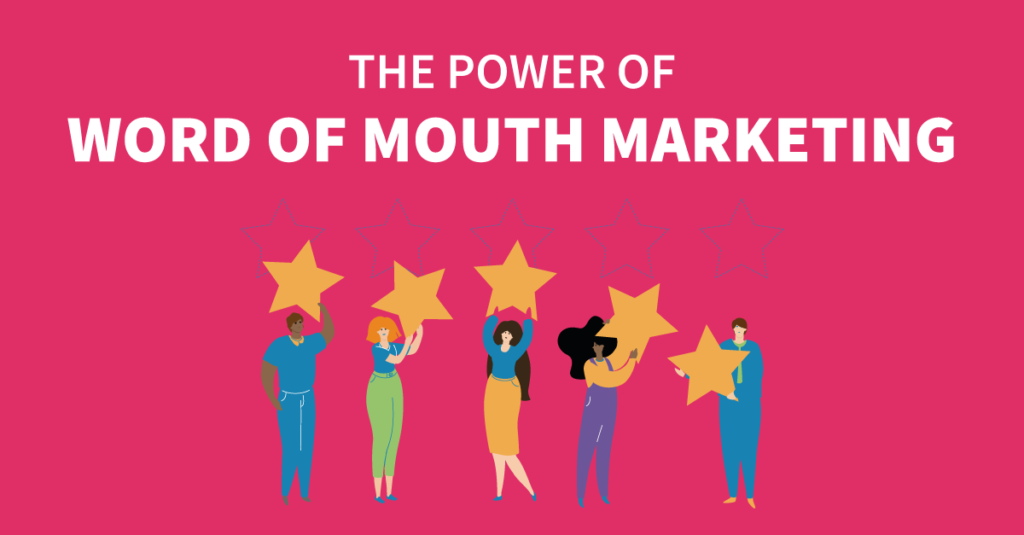
Have you ever tweeted about an experience with a brand? Shared a picture of your food and mentioned the restaurant? This is a form of ‘word of mouth marketing’. Word of mouth marketing, also referred to as word of mouth advertising, is essentially an organic method of spreading awareness and information about a company.
One of the main reasons companies value word of mouth is because it’s free. People will discover your brand from friends, family, and even from strangers online.
There are different ways in which this method is used
It isn’t just limited to social media. Traditionally, it was based on recommendations to friends and family. An example is if you run into your friend at a supermarket and during your conversation you mention a recent purchase you made and the positive experience you had. Another method is through online reviews and testimonials from real customers.
Why is it so important for brands to promote word of mouth?
Think about it – when you’ve shopped on platforms such as Amazon, you scroll down and check the reviews of the product before you purchase it.
Word of mouth plays a big part in your customer’s final decision as to whether or not they purchase your products or services. They trust their friends and family members if they recommend a business, and they even trust other customers who leave a review online.
Statistics to prove the power of word of mouth
- 83% of consumers say they either completely or somewhat trust recommendations from family, colleagues, and friends about products and services – making these recommendations the highest ranked source for trustworthiness. [Nielsen]
- 90% of people trust suggestions from family and friends. [HubSpot]
- 70% of people trust consumer reviews online. [HubSpot]
- 74% of consumers identify word-of-mouth as a key influencer in their purchasing decision. [Ogilvy Cannes]
- 72% of people get news from friends and family, making word-of-mouth the most popular channel for sharing. [Pew Research Center]
- 68% of people trust online opinions from other consumers, which places online opinions as the third most trusted source of product information. [Nielsen]
- 88% of people trust online reviews written by other consumers as much as they trust recommendations from personal contacts. [BrightLocal]
How to get consumers talking
Yes, it’s a powerful method of marketing, but you may find it difficult to get people talking about you. Here are some tips to help:
Improve your overall service
If you want it to come naturally, make sure you’re providing the best service you can. Do some competitor analysis to see what others are doing that you can improve on. Ask yourself:
Is my price competitive?
It doesn’t necessarily need to be the cheapest, especially if other aspects of your business are great, such as turnaround and customer service. 86% of buyers are willing to pay more for great customer experience. Regardless, it’s still a good idea to take a look to see what other prices are being offered by competitors to see if you can match it.
Do I provide a good online experience?
Take a look at your website, does it provide a good experience for your customers. Do you have clear navigation, sleek design and fast loading speeds?
Remember to also review the mobile version of your website. It needs to be optimised to ensure it works just as well on a mobile device as it does on a computer. 57% of customers won’t recommend a business with a poorly designed website on mobile. If it isn’t mobile-friendly, 50% of customers will stop visiting it, even if they like the business.
Do I provide good customer service?
Online chats, email, phone, social media, FAQs pages, automated systems – there are so many different methods for consumers to contact businesses.
This also means that people now expect faster response times. Does your company offer fast methods for your customers to contact you?
It’s important to ensure anyone handling the customer service for your business is trained to do so and can offer solutions in a timely manner. Sympathise with the consumer and try your best to turn a negative experience into a positive.
Also, ensure there is a clear way for people to contact you on your website. There is nothing more annoying than having to go through a large number of forums and threads just to be able to find a contact number.
It’s still a good idea to create a FAQs page, but also provide easy access to your contact details so people don’t feel irritated before they even send you a message or call you.
If you’re in the catering business such as a restaurant or cafe, make sure to be friendly and welcoming. Customer service during the purchase stage is just as important as the aftercare. If you appear rude or unwelcoming, it could upset customers and result in them going elsewhere in the future.
If you’d like to know more about delivering good customer service, we offer a funded, online course in Principles of Customer Service. Find out more here.
Offer Incentives
Referral marketing is a segment of word of mouth marketing. These are techniques such as introducing a ‘refer a friend’ incentive. Common incentives include sign-up bonuses, discounts, and chances to win a prize.
Ask them to leave a review
Once they have received their item or service, you can ask them to leave a review. If they are in a physical store, you can ask them on receipts, or pass them a card telling them to leave a review. It will work better if you offer the chance to win a prize or discount on their next order. You can also ask them through email to leave a review about their experience – you’ll be surprised how many people will do it without an incentive as long as you give them a gentle reminder!
Level 3 Digital Marketer Apprenticeship
If you want to know more about increasing your brand awareness and reaching your audience, take a look at our funded Level 3 Digital Marketer Apprenticeship. It’s an ideal programme if you’re looking to hire a team member to be responsible for the digital side of your business, or want to upskill. Find out more here.


